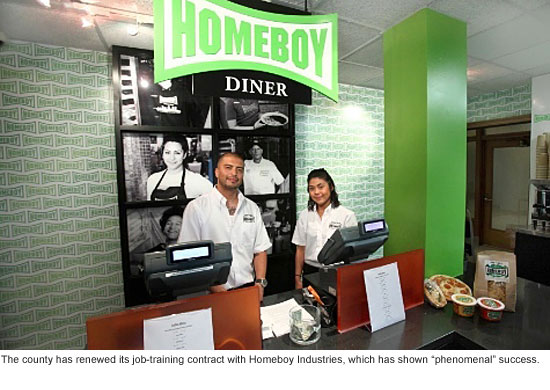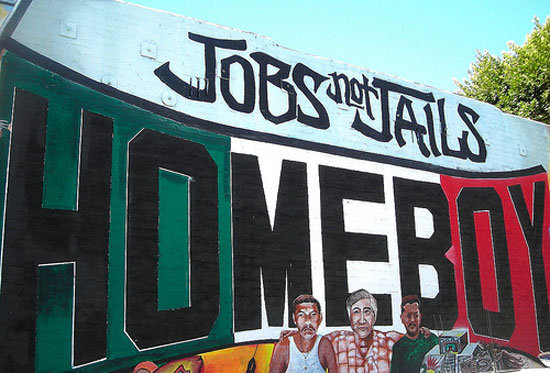County re-ups with Homeboy
July 13, 2011
 Nine months after Los Angeles County stepped in to help keep the doors open at Homeboy Industries, its contract for re-entry services has been extended, preserving a key source of job training for gang-affiliated probationers and parolees.
Nine months after Los Angeles County stepped in to help keep the doors open at Homeboy Industries, its contract for re-entry services has been extended, preserving a key source of job training for gang-affiliated probationers and parolees.
The Board of Supervisors on Tuesday voted to renew the county’s $1.3 million agreement with Homeboy, which originally had been approved as a 9-month pilot project.
The public money will pay for 12 more months of job training, tattoo removal, legal counseling and other services for more than 600 county probationers and parolees between the ages of 14 and 30. It also will continue to fund 20 to 30 revolving job trainee positions at Homeboy businesses, along with an ongoing outside evaluation of the program’s effectiveness.
Although the final evaluation of the joint venture’s first nine months won’t be complete until August, the social scientists conducting it say Homeboy’s success rate appears to be strikingly higher than the national average.
UCLA adjunct professor Jorja Leap said preliminary data shows approximately 80% of the county-funded trainees to be either fully employed or still enrolled in the Homeboy program at the end of the initial 9-month contract, with only about 10% back behind bars. The national rate of re-incarceration among gang members is about seven times higher than that, Leap says.
“This is all very cautionary and short term, and with the contract renewed, we’ll be able to learn even more,” she says. But if the numbers hold up, “it’s absolutely phenomenal.”
Founded in 1992 by the Rev. Greg Boyle, a Jesuit priest, Homeboy Industries is the nation’s largest gang intervention program. Operating under the slogan, “Nothing stops a bullet like a job,” the organization operates a bakery, two cafes, a silk screening and embroidery shop and a janitorial company, among other endeavors.
The organization also is known for its tattoo removal program—a prosaic but potentially life-altering service that annually eliminates a crucial job impediment for thousands of repentant gang members. Boyle has said Homeboy’s job training, educational, legal and mental health services help some 12,000 at-risk youths and young adults every year.
Boyle has noted that Homeboy has served for years as the county’s unofficial—and largely un-reimbursed—“after-care and re-entry program for gang members.” According to Leap’s preliminary numbers, Homeboy’s client base is overwhelmingly, if not entirely, made up of county probationers and parolees who came to Homeboy on their own initiative.
The county also runs various re-entry programs for ex-inmates, but the demand for help far outstrips the supply, says Cal Remington, chief deputy of the county’s Department of Probation. So when a financial shortfall last year forced the organization to lay off hundreds of staffers, Homeboy turned to the county as a natural ally.
“This is really a public safety issue for the county,” says Homeboy’s Chief Operating Officer Veronica Vargas. “You can’t expect someone who has never held a job to walk back into society and know how to get hired.”
Remington calls Homeboy “a good resource,” particularly in light of the state’s desire to shift responsibility to the county for thousands of non-violent parolees, who “still tend to need a lot of resources wrapped around them…Homeboy is legitimate, and has credibility in the community, so I think they could have a real role to play.”
Posted 6/28/11













 405 bridge work causes a stink
405 bridge work causes a stink
